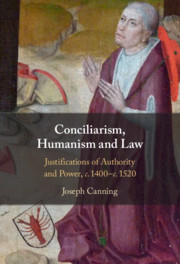Conclusion
Published online by Cambridge University Press: 18 June 2021
Summary
This book has confirmed, through its findings, that a most fruitful way of studying fifteenth-century justifications of power has indeed been to approach both through the issues raised by conciliarism and its papalist opponents, and through the ideas of the humanists, bearing in mind the context of juristic ideas. The sheer variety and complication of the arguments produced has been striking. The fifteenth century can appear as less productive in terms of political thought than the fourteenth but such an impression would be misleading in the areas covered here. There was a genuine intellectual creativity building on previously developed ideas. It has, indeed, become clear in the course of this book that the writers, whom I have considered, shared the fundamental assumption that power needed to be justified. The notable exception was of course Machiavelli. The arguments validating power could be drawn upon by rulers and regimes to justify their actions, since it is difficult to think of any form of government which in practice did not want to present itself as justified in what it did. Self-justification appeared fundamental to the practice of politics then as now.
- Type
- Chapter
- Information
- Conciliarism, Humanism and LawJustifications of Authority and Power, c. 1400–c. 1520, pp. 179 - 182Publisher: Cambridge University PressPrint publication year: 2021

